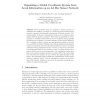Free Online Productivity Tools
i2Speak
i2Symbol
i2OCR
iTex2Img
iWeb2Print
iWeb2Shot
i2Type
iPdf2Split
iPdf2Merge
i2Bopomofo
i2Arabic
i2Style
i2Image
i2PDF
iLatex2Rtf
Sci2ools
127
click to vote
IPSN
2003
Springer
2003
Springer
Organizing a Global Coordinate System from Local Information on an Ad Hoc Sensor Network
Abstract. We demonstrate that it is possible to achieve accurate localization and tracking of a target in a randomly placed wireless sensor network composed of inexpensive components of limited accuracy. The crucial enabler for this is a reasonably accurate local coordinate system aligned with the global coordinates. We present an algorithm for creating such a coordinate system without the use of global control, globally accessible beacon signals, or accurate estimates of inter-sensor distances. The coordinate system is robust and automatically adapts to the failure or addition of sensors. Extensive theoretical analysis and simulation results are presented. Two key theoretical results are: there is a critical minimum average neighborhood size of 15 for good accuracy and there is a fundamental limit on the resolution of any coordinate system determined strictly from local communication. Our simulation results show that we can achieve position accuracy to within 20% of the radio range ev...
Accurate Local Coordinate | Coordinate System | Inter-sensor Distance | IPSN 2003 | Sensor Networks |
Related Content
| Added | 07 Jul 2010 |
| Updated | 07 Jul 2010 |
| Type | Conference |
| Year | 2003 |
| Where | IPSN |
| Authors | Radhika Nagpal, Howard E. Shrobe, Jonathan Bachrach |
Comments (0)

